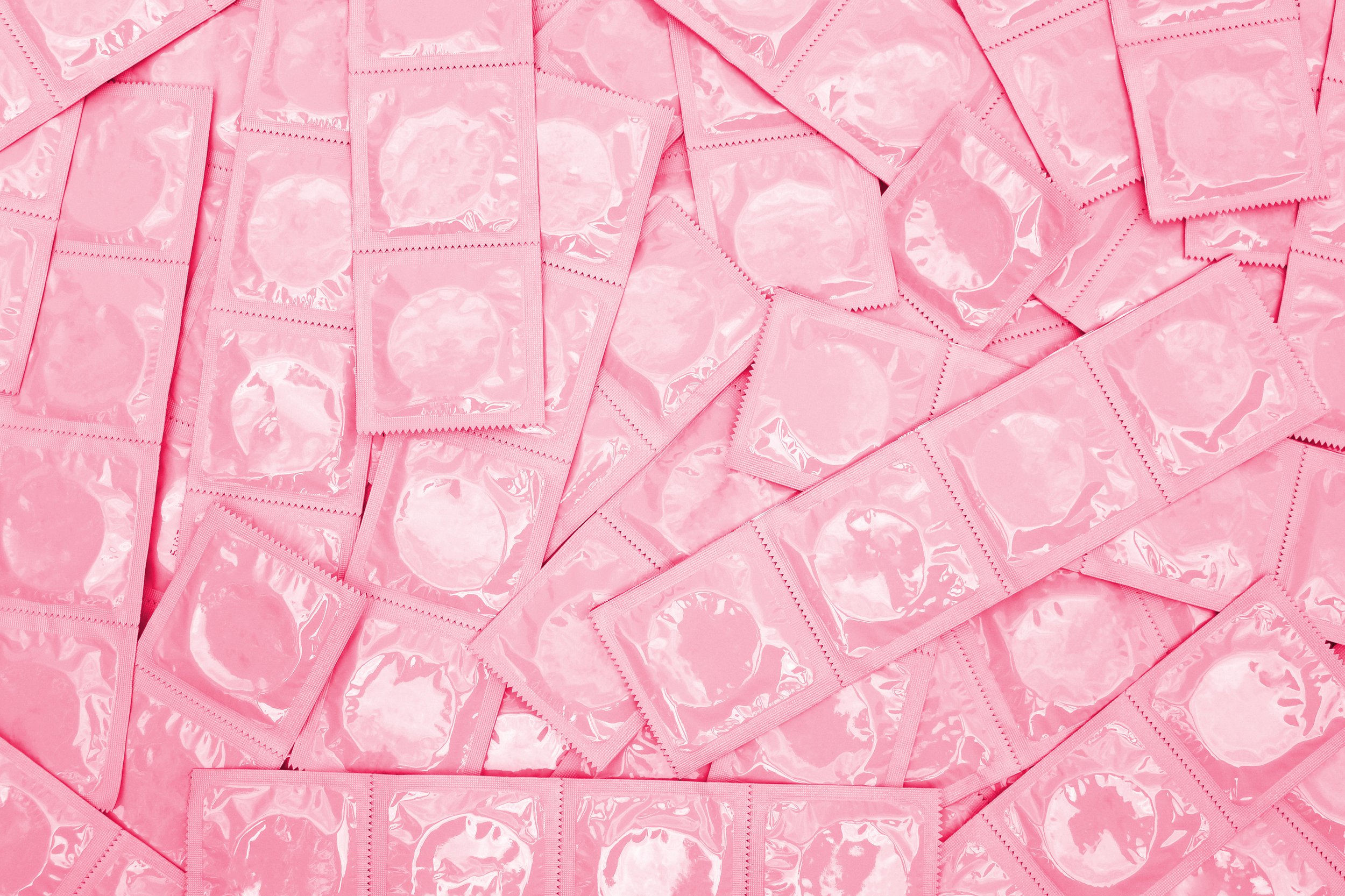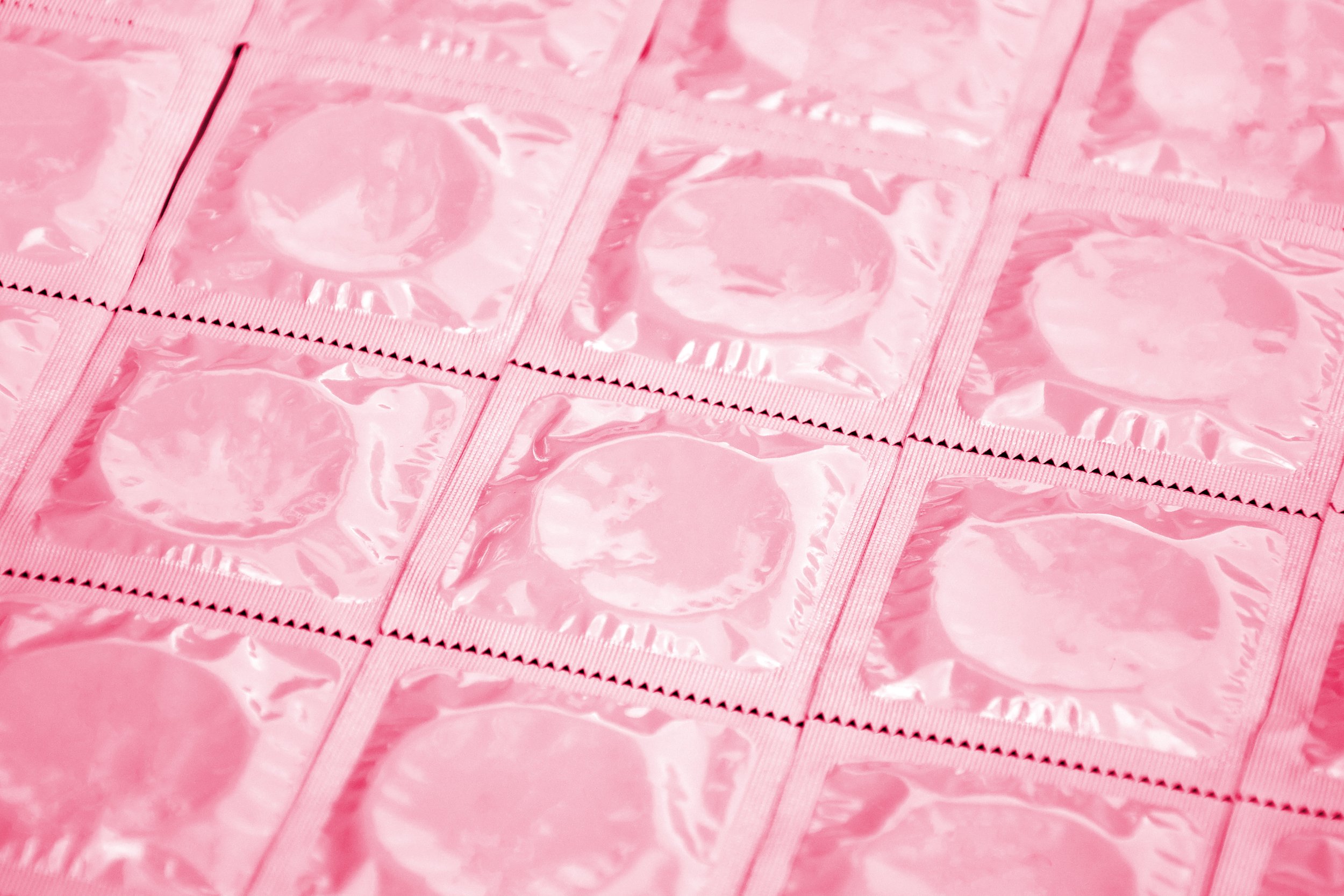
Safer Sex
Let’s talk about sex, baby! This page is all about safer sex eduction and debunking sexual health myths. As a sex worker and advocate I am deeply interested in sexual health and harm reduction. Safer sex is the hottest sex.
While I provide information and discuss topics related to sexual health, I am not a medical professional and do not offer medical advice or diagnosis.
I’m passionate about debunking myths surrounding sex work and STIs/BBVs (Sexually Transmitted Infections/Blood-Borne Viruses). I’m a self-confessed 'sexual health nerd’, and this page is a way for me to engage candidly about my experiences with safer sex strategies and debunk some STI/BBV myths.
Before we get into everything, it's essential to recognise that no ‘in person’ sexual activity is 100% risk-free when it comes to STI/BBV. Therefore, no physical sexual acts can be described as entirely ‘safe’. That’s why I like to use the term ‘safer sex’, which focuses more on harm reduction and minimising risk - rather than abstaining from sex altogether.
There’s a huge misconception and stigma that sex workers are ‘vectors of disease’. However, sex workers actually have lower rates of STI/BBV transmission than the general population. As experts in our own health, sex workers are committed to sharing accurate information and strategies that promote safer practices. Let’s be real - it makes sense that sex workers are super diligent about our health, as if we catch something - we may not be able to work! As such, sex workers actively engage in the implementation of safer-sex strategies, regular voluntary testing, and generally have a deeper understanding of STI/BBV identification, transmission and prevention compared to the general public.

Despite all of the above, it’s important to note that while I provide information and discuss topics related to sexual health, I am not a medical professional and do not offer medical advice or diagnosis. Instead, this page serves to define STIs/BBVs, debunk myths surrounding sex work and STIs and outline harm reduction strategies specific to sexual health.
All about STIs and BBVs.
All about STIs and BBVs.
So, you keep seeing these acronyms, STI and BBV. But what exactly do they stand for? STI stands for ‘Sexually Transmitted Infection’, while BBV stands for ‘Blood-Borne Virus’.
-
An STI is an infection that can be transmitted through sexual or intimate contact, including vaginal, anal, or oral sex - and in some cases, kissing. The organisms that typically cause STIs enter the body through broken skin or mucous membranes. Common STIs include chlamydia, gonorrhoea, syphilis, genital/oral herpes and HPV (human papillomavirus). Some STIs can be cured with antibiotics or other treatments, while others, such as herpes, are chronic and require ongoing management.
-
A BBV refers to a virus that can be transmitted through blood-to-blood contact. While some BBVs can also be transmitted sexually, they are not exclusively transmitted through sexual contact. Examples of BBVs include HIV (Human Immunodeficiency Virus), hepatitis B (HBV), and hepatitis C (HCV). During vaginal or anal sex, even minor cuts or micro-tears in mucous membranes, especially in cases of inadequate lubrication, can serve as entry points for BBVs.
-
People with STIs and BBVs may exhibit mild or no symptoms, while others may experience severe symptoms. Transmission can occur regardless of whether symptoms are present, which means it’s important to engage in harm reduction strategies, preventive measures and regular testing. Both STIs and BBVs can have serious health consequences if left untreated, and contracting one STI or BBV can also increase your risk of being infected with another.
-
In the past, STIs were commonly referred to as STDs, which stood for ‘Sexually Transmitted Diseases’. However, this terminology has undergone changes over the years.
The term 'disease' typically refers to medical conditions with recognisable symptoms and signs of illness. However, many STIs can be present without causing noticeable symptoms (asymptomatic) or with mild symptoms that may go unnoticed or be mistaken for something else. The word ‘disease’ in the context of sexual health also holds a significant amount of stigma. Therefore, the word 'infection' is a more inclusive term because it emphasises that many STIs are treatable and manageable with timely diagnosis and proper medical care.

There are so many myths surrounding how you can transmit STIs and BBVs. Here’s a few frequently asked ‘transmission’ questions…
-
I’ve said it many times, and I’ll say it again: the only type of in-person sex that is 100% ‘risk’ free is no sex. The transmission of STIs can occur when infectious bodily fluids, such as semen, vaginal fluids, blood, or sores, come into contact with the mucous membranes in the mouth, throat, or genital area.
As the nature of oral sex often involves close contact with these bodily fluids, it does make it possible for infections to spread from one person to another. For example, some common STIs that can be spread through oral sex are gonorrhoea, chlamydia, syphilis and herpes. You can use barrier protection during oral sex, such as condoms and dental dams which significantly reduces the risk of transmission - but this isn’t 100% risk free. This is why it’s super important to always include throat swabs in your regular sexual health tests if you engage in oral and/or kissing regardless of whether you are a client, sex worker or just anyone from the general public.
-
The myth that Lesbians can’t ‘catch’ anything is so reductive of Lesbian sex and quite ignorant of Queerness and gender in general. Just like any type of sex, if there is an opportunity to exchange bodily fluids such as vaginal discharge, blood or have direct contact with sores or infected mucous membranes - you are at risk of contracting or transmitting an STI or BBV.
-
While the risk is generally lower compared to other sexual activities, there are some STIs that are transmitted through ‘deep french’ style kissing (or any mouth to mouth contact). For example, the Herpes Simplex Virus (or HSV, both 1 and 2) is one of the most common STIs transmitted through kissing. It’s always a good idea to ask your doctor to also give you a throat swab when you do your routine sexual health tests if you love a good pash!
-
It’s virtually impossible to contract an STI from a toilet seat. And if you were to ‘catch’ something from a toilet seat, it wouldn’t be ‘sexual’ unless you were having sex on the toilet. And if that’s the case, it was probably the sex that transmitted the STI - not the toilet. The reason why toilets are not carriers of STIs, is because most STI-causing organisms, such as bacteria, viruses and parasites, can’t survive long outside the human body. This is especially evident on cold, hard surfaces - like toilet seats!
Debunking Myths.
Debunking Myths.
I’m passionate about debunking myths surrounding sex work and STIs/BBVs (Sexually Transmitted Infections/Blood-Borne Viruses), and I love using my platform to educate both my peers, clients and the broader community. However, if you continue to hold any of these stigmas or believe the following statements are ‘true’ even after I have debunked them - you need to further educate yourself via the resources provided at the bottom of this page.
-
The ‘HIV is a death sentence’ myth is so outdated, and causes harm to HIV positive people and other community members who are often pinned as HIV ‘transmitters’ (like the LGBT+ community and sex workers). It also discourages people from getting tested and seeking treatment.
Medical progress has transformed HIV from a fatal illness into a chronic condition that is managed with ongoing treatment. With early diagnosis and consistent treatment using antiretroviral therapy (ART), people living with HIV can have long, healthy lives. ART works by suppressing the virus, reducing it to undetectable levels. This not only prevents HIV progressing to AIDS but also means the virus cannot be transmitted to others (Undetectable = Untransmissable, or U=U). While there is currently no cure for HIV, ongoing research and improved treatments continue to enhance the quality of life and overall life expectancy for people living with HIV.
-
This myth goes hand-in-hand with the outdated notion that ‘HIV is a death sentence’ - which creates fear and perpetuates stigma towards people living with HIV and affected communities. Advances in HIV treatment means that people living with HIV now have access to therapy that allows them to achieve ‘undetectable viral loads’. This means that (with consistent use) they can’t transmit HIV to their sexual partners. So, with consistent use of ART (antiretroviral therapy), condoms and other safer sex strategies - people with HIV can and do engage in healthy, safer sexual relationships.
-
The myth that people who have herpes can't engage in safer sex is completely unfounded and perpetuates stigma.
So let’s chat about herpes: the herpes simplex virus (HSV) comes in two types: HSV-1, typically causing oral herpes (cold sores), and HSV-2, which usually causes genital herpes. Regardless, you can have HSV-1 on your genitals and vice versa on your mouth (or anywhere else on your skin!). Both types can be managed effectively with antiviral medications, which reduce the frequency and severity of outbreaks and also lower the risk of transmission.
In my experience, people who have been diagnosed with HSV-2 or HSV-1 on their genitals have been way more knowledgeable about safer sex strategies than the general public, and are super diligent in preventing the transmission of herpes to their partners. In all honesty, I’m more worried about the people who aren’t regularly testing for STI/BBV and those who don’t pay attention or dismiss possible symptoms on their bodies. Some big red flags for me have also been clients who claim to ‘just have a cold sore’ and still ask me to perform kissing services with them or go down on me - while they have an active outbreak.
People with HSV can engage in safer sex by using condoms and dental dams, avoiding sexual contact during outbreaks, and communicating openly with their partners. With these safer sex strategies applied, the risk of transmission can be significantly minimised. So yup, for all those who weren’t aware - people with herpes can and do engage in safer sex!
-
The myth that sex workers must do literally anything that we don’t consent to (and that includes seeing clients with visible STI symptoms) is both incorrect and harmful. First and foremost, sex workers prioritise our health and safety.
A safer sex strategy that a lot of us use are ‘health checks’. A health check is a quick and thorough inspection of a client’s genitals and surrounding area prior to conducting any sexual services. In a health check, we will look for signs of STIs - like unusual sores, rashes or discharge. I perform health checks on my clients, and if I find something that may be indicative of an STI - I will either terminate the booking or propose an alternative service. The notion that sex workers can’t say ‘no’ to anything to do with our work is incredibly dangerous, and really diminishes our autonomy and agency as professionals.
-
Firstly, the term 'clean’ is harmful as it implies that those who have had STIs or live with chronic sexually transmitted conditions are 'dirty.' Don’t use the word ‘clean’ when talking about STIs.
As for your STI results - I don’t want these, and neither do many of my sex worker peers. Don’t get me wrong, I absolutely want you to get regularly tested - but showing the results makes me feel uncomfortable. This is for a few reasons, such as:
These results are not an accurate representation of your STI status at the time of seeing me. I can’t know if you’ve had relations between getting tested and seeing me, so the results are not indicative of anything definite.
Presenting your STI results makes me feel pressured to engage in unprotected services with you. This will put me on edge as it raises concerns about my safety and the potential for non-consensual acts like stealthing.
-
The idea that sex workers would tamper with a condom is such an incredibly strange and false accusation. Why would we bother to use condoms if our motive was to tamper with them? This stereotype perpetuates unnecessary mistrust and stigma towards sex workers. In reality, we are often more vigilant about safer sex than you!
And for all the clients that leave with their condoms or cum tissues - I’ll say it again - sex workers don’t want your sperm. We don’t want to sell it on the black market. We aren’t going to sprinkle it all over a crime scene. And we certainly don’t want to impregnate ourselves with it. Your precious little pile of sperm is going straight into the bin… where it belongs.
-
The stigma that sex workers are inherently high-risk vectors of STIs and BBVs is incredibly harmful, and completely unsupported by evidence. In fact, numerous studies in decriminalised jurisdictions demonstrate that rates of STI/BBV among sex workers are lower than the general public. No in-person sexual activity is 100% risk-free when it comes to STI/BBV. However, sex workers are professionals who prioritise both our own health and safety, as well as that of our clients. We implement safer-sex strategies and engage in regular voluntary testing. We also have a much deeper understanding of STI/BBV identification, transmission and prevention compared to the general public.
-
It is so offensive to make judgements on any sex worker about the type of sex work we do, or the services we offer. The myth that some sex workers are more ‘elite’ than others perpetuates the harmful concept of the 'whorerachy’. This term is what we use to call the ‘hierarchy’ that unfairly judges sex workers based on the false idea that some sex workers or types of sex work are superior to others. This system is (strangely) most often based on a sex worker’s proximity to genitals, which is usually why people wrongly conceive that workers who engage in unprotected services are not ‘elite’.
All sex workers have the agency to make decisions about the services we provide, which is usually guided by our individual circumstances and personal boundaries. Financial necessity can influence these decisions, but it doesn’t negate our autonomy or make us ‘lesser’ because we might only do a service for the payment.
Sex workers continuously evaluate what services we are comfortable offering. The type of services we offer (or even the area of the industry we work in) can vary throughout our career or even from day to day, or client to client. This flexibility doesn’t diminish our professionalism or status. Judging sex workers based on the services we provide undermines our autonomy. And quite frankly, judgement surrounding any aspect of sex work is grossly disrespectful and fuelled by stigma.
And for those wondering, I don’t offer unprotected services - but that doesn’t make me a better or ‘safer’ choice than any sex worker that does.
-
Requesting unprotected services from a sex worker is inappropriate and disrespectful. Unprotected services should only be offered at the sex worker’s discretion - it’s up to us to bring this up with our clients. Any attempt to coerce or pressure a worker into providing these services is totally unacceptable - especially if it is written on our advertisements or is explained to you prior or during the booking.
-
The idea that all sexual acts aren’t considered ‘sex’ unless it’s penetrative is so reductive to not only ‘sex’ itself, but also the diverse services and roles within the sex work industry. This myth perpetuates such a narrow and inaccurate view of sex and intimacy, as it ignores the wide range of sexual acts that can be equally, and sometimes more pleasurable than penetration. It is also not only incredibly ableist, but devalues queer sex where the people engaging may not be able or want to engage in penetration.
Sex work (and sex) encompasses so many facets of intimacy, like companionship, conversation, massage, dancing, fetish, fantasy fulfillment, and more. By reducing sex and sex work to only penetrative acts overlooks the multifaceted nature of our work and the diverse skills that sex workers have. For example, sex workers also often tailor our services to meet each client, which can vary significantly. Often, clients see value in emotional connection and non-sexual physical touch that we can provide them (such as cuddling!).
-
The idea that sex workers are ‘dirty’ is not only incredibly offensive, but so far from the truth. Suggesting that we are inherently unhygienic is disrespectful and dehumanises us.
In reality, sex workers deeply care and are proactive about our sexual health and general cleanliness. But please note, 'clean' is not a word that should be used in relation to sexual health. We regularly get tested and apply harm reduction strategies to protect not only our health, but also the health of our clients. Sex workers, especially those of us who work in brothels or massage parlours, take multiple showers during our shifts. We also have incredible attention to detail with regards to maintaining a hygienic work environment by cleaning our work-room, changing bed linens, and disinfecting surfaces between each booking. Our cleanliness also extends to having strict hygiene standards for our clients. I’m constantly asking clients to get back into the shower before any interaction and I have refused service if a client has not met my hygiene standards.
-
For those who haven’t heard the term before, ‘chem-sex’ refers to the use of drugs (like GHB, for example) to enhance sexual experiences. It’s a practice that a lot of people, including some sex workers engage in. However, it is a myth that all sex workers have chem-sex - or even use drugs and/or alcohol at all. For example, I’ve been sober from alcohol (and most drugs) since 2017 and don’t drink during bookings or in my private life.
With this said, it’s important to respect all sex workers’ (and people in general) choices regarding drug use, as stigmatising people who use drugs only perpetuates harm, isolation and misinformation.
Are you a client who is STI/BBV positive?
If you have a life-long STI/BBV, I’d appreciate it if you were open and transparent about it before our session. I'm more concerned about those unaware of their sexual health due to infrequent check-ups. Being upfront fosters trust; and if I discover a really obvious, undisclosed condition during a health check, I usually cancel the booking as that trust has been broken.
Whether or not we can proceed will depend on the specific STI, the type of services you're interested in, and whether you're experiencing any active symptoms. During the initial health check at the beginning of our booking, I will be looking for any visible signs of infection to assess the risk regardless.
For life-long STI/BBV such as HPV, HSV, and HIV, there are effective safer-sex strategies that we can employ to help keep me protected. With open communication and by adjusting our activities accordingly, we can usually find a way to still do most of the service.
My harm reduction strategies.
My harm reduction strategies.
Harm reduction refers to strategies and practices designed to minimise the risk of STIs, without necessarily eliminating sexual activity altogether. Harm reduction approaches acknowledge that while abstinence is the most effective way to avoid risks, it is not necessarily a realistic or desirable choice for everyone. Here are some of my harm reduction strategies below:
-
At the beginning of a booking, I will conduct a ‘health check’ on my client where I will examine their genitals (and surrounding area) to look for any visible signs of STIs. If I find something of concern to me, I may terminate the session or propose alternative services.
-
I use ‘external’ condoms (otherwise known as male condoms) on my client’s penis when giving oral sex or having penetrative sex. When using condoms, I always make sure I have a variety of sizes available and I’m an expert at fitting the correct size of condom for my client. I also check throughout the booking to see whether the condom is still in place, and during penetration - I always ensure I pinch the condom to hold it in place when a client ‘pulls out’. I don’t use ‘internal’ condoms (otherwise known as female condoms), but some sex workers do.
-
A ‘dam’ is a thin, flexible sheet (commonly made of latex) that is used during oral sex to create a barrier between the mouth and the genital or anal area. I often use dams as a safer sex strategy when giving and receiving oral services with clients.
-
I’m a huge fan of sanitising my hands (and my clients) throughout the booking to reduce the risk of mixing fluids. I always pay attention to my client’s hands, and make sure that the hand they are using to touch my genitals hasn’t already been used to touch themself (or someone else). If it has, I will ask my client to hand sanitise before they touch me. I explain this process to clients during the booking - but they often don’t understand or ‘forget’.
After repeated failed attempts to prevent the client from touching my genitals after they have touched themself - I will either terminate the booking, put on my underwear or place a condom on the client for the rest of the booking. And for the love of god - when I give you hand sanitiser, it is NOT lube. Rest assured, I will never hand you lube. I am in control of the lube. So when I squirt a dollop of clear liquid on your hands, assume it is hand sanitiser and ensure your hands have properly dried before touching any of my sensitive bits (and yours)!
-
The term ‘frottage’ refers to the act of people rubbing their bodies or genitals against one another for sexual stimulation (typically without penetrating). I don’t engage in frottage with my clients, as it is not a sexual health risk that I want to take in my work.
I am always aware of the position that clients are in and usually don’t allow clients to sit on top of me and massage me, or lay on top of me when they don’t have a condom or underwear on. There have been too many times where clients have tried to engage in non consensual ‘frottage’ with me, or haven’t been careful with where their penis is ‘dangling’ on my body. The “oh I didn’t realise my penis was accidentally touching your vulva!” is a tried and tested method of me showing you the door.
-
I love sharing my sex toys with clients, and am always excited to introduce you to my favourites. To make this safer for us, I always make sure I pop a brand new condom on my toys every time I share them. I also make sure that I change the condom between my client using it on themself, or someone else and then using it on me. In addition to this, I also use antibacterial toy cleaner before and after every booking, and store my toys hygienically and safely between use.
-
I always make sure my clients have showered before I begin any sexual services with them. Of course, I also shower between and/or directly before bookings too. I also pay attention to any fluids or pre-cum that might occur before any intercourse has taken place. If there is significant pre-cum and it’s surrounding their genital area, I may ask my client to jump back in the shower before engaging in penetration/intercourse with me. If a client has an orgasm that comes with a large amount of bodily fluids, I will also usually ask them to shower and I will change bedding/towels if they would still like to continue any sexual activity with me afterwards.
-
Doubles and Couples bookings can be a super tricky space to navigate in terms of ‘safer sex’ as there’s simply more cooks in the kitchen. A ‘double’ booking refers to a session where a client has booked myself and another sex worker. Whereas a ‘couple’ booking refers to two clients seeing me as a sex worker (at the same time) - for example; two people in a relationship. Here are some of the safer sex strategies I have in place for these type of bookings:
I like to engage in a quick ‘safer sex’ chat with couples prior to any sexual activity taking place. At the start of the booking, I ask them if they share fluids between them. If they say yes, I explain to them that having sex with me is going to be a little different as we have to be more careful about making sure my fluids don’t mix with theirs and vice versa.
I always have a hand sanitiser bottle readily available and routinely get everyone to hand sanitise throughout the booking. I also keep myself aware if someone is trying to touch me with a hand that had already been used to touch themself or another person.
I make sure I change condoms in between using the same sex toy (or penis!).
For ‘doubles’ bookings, I usually don’t do them with sex workers who are new to the industry. I say this not as a blanket statement, as sometimes I really enjoy teaching new sex workers in doubles - but only if that person is willing to let me lead and is open to learning. I’ve been in way too many situations with newer sex workers that don’t yet have a comprehensive grasp of safer sex strategies and aren’t open to following my lead. Of course, everyone has their own way of doing things and doesn’t have to follow the same harm reduction strategies. But it’s important that when I’m working with another sex worker, we’re both on the same page. So, chatting beforehand is an absolute must.
Health risks transmitted through intimate contact
There are other health risks associated with my work as a sex worker that are not typically classified as STIs or BBVs but can be transmitted through close or intimate contact. This includes conditions like scabies, pubic lice and thrush.
Below are three health risks that are the conditions that I am prone to contracting generally, which contributes to a higher risk in my work as a sex worker.
-
If you arrive for our appointment with a contagious illness like the flu, I will be unable to see you. This is not only to prioritise our collective health and well-being but also out of respect for the nature of my work. Sex workers don't have the benefit of sick pay or the luxury to take extended time off when we're unwell. Additionally, the close physical contact involved in our sessions can easily transmit illnesses. For these reasons, it’s important that you respect my health and wellbeing. Unfortunately, I won't be able to offer a refund in such cases where I turn up and you are visibly unwell. Please see my cancellation policy and reschedule with more than 72 hours notice. We can enjoy our time together when you're feeling better!
-
A urinary tract infection (UTI) is an infection that occurs in any part of the urinary system, which includes areas such as the kidneys, bladder, and urethra. Most UTIs are caused by bacteria, with Escherichia coli (E. coli) being the most common culprit. They aren’t necessarily caused by having sex, but sometimes sex can be a trigger.
UTIs are typically treated with antibiotics. If left untreated, a UTI can lead to more serious kidney infections. The downside to treatment (not for everyone, but usually for me), is that the antibiotics can cause thrush (read more below).
Some people are prone to UTIs - I’ve had them since I was a little girl. This means I have to be extra careful in sex (and just in general life) so that I can avoid getting one. Part of this extends to not providing any unprotected penetration, not allowing clients to ‘finger’ me, and making sure when clients do touch my vulva - their hands are clean. I have been hospitalised before from UTIs, they aren’t fun and they hurt a lot! Which is why I really appreciate it when clients and other workers respect my hygiene standards and remember to wash their hands or hand sanitise before touching my vulva. Bonus points for doing so without me having to prompt!
-
Thrush, also known as a yeast infection or candidiasis, is a fungal infection caused by the Candida species. Thrush usually affects moist areas, such as your mouth, genitals or skin folds. Thrush is usually easily treated with over-the-counter antifungal medications, but it can have more serious strains or become a chronic issue.
I am really prone to thrush, because of being prone to UTIs. The antibiotics given to me for UTIs often trigger thrush. I’ll never do sexual bookings when I have thrush, which means that it’s really important for me not to get myself hit by the UTI/Thrush domino effect and thus be out of work. This is why I am so particular about hygiene and clients washing their hands before touching me. As I mentioned before, UTIs can be caused by bacteria in the urinary tract - and because I’m already super sensitive, my hygiene practices need to be strict. So please, don’t be offended when I ask you to wash your hands in a booking!

In my whole time working as a sex worker, I’ve only had two condom breakages so far (touch wood!). Though they are rare, condom breakages do happen and is part of the reason why in-person sex can never be 100% ‘risk free’.
I’m going to outline what I do in the event of a condom breakage. Please don’t take this as advice - I’m just sharing what I do to educate my clients on my processes (in case it happens with us!) and also share my experiences with my peers as a skill-share exercise.
Both times the condom broke, I didn’t realise until after the client had already ejaculated. For obvious reasons, this sits more on a severe side of the sexual health risk spectrum - so here’s my procedure:
-
My protocol for a condom breaking during a service (even if the client hasn’t cum) is to stop any penetration or touching of my vulva and proceed to the next steps immediately. This is because further penetration or touching may irritate the lining of my vaginal wall and may cause any ‘pre-cum’ or potentially infectious fluids to enter my mucus membranes. There are plenty of other fun things we can do together without you touching my vulva - so we can do them instead.
-
Before we return to any sexy stuff, I will have a shower to remove any excess/foreign fluids from inside of me or on my body (I’ll also try and do a wee in the shower!) and wash myself thoroughly. Fellow sex workers, don't use your fingers to 'scoop' - follow the instructions on Red Book.
Please don’t be offended when I do this straight away as it is a necessary step to minimise risk of contracting STI/BBV. Even if you claim to not ‘have anything’ - nobody can know this for sure (not even me!), so I treat every condom breakage in the same way.
-
After I’m all freshened up, I’ll ask if I can discuss some sexual health topics with you and we can ask each other questions. You don’t have to provide answers or have this conversation - I want you to feel safe to share information with consent. But these answers will help us assess how risky the breakage is and whether we need more urgent medical care. Some questions I have asked in the past are:
How long have you been in Australia, and/or have you had sex overseas recently?
When was your last sexual health test?
Do you engage in unprotected penetrative sex, and if so, with whom?
Do you engage in anal sex or do you also have sex with men (if the client has a penis)?
The first time the condom broke, I asked these questions and I determined that the risk for STI/BBV transmission was quite low. However, the second time it happened - after asking these questions I determined that the risk of HIV transmission was quite high.
I went to the hospital immediately, and went on PEP (Post Exposure Prophylaxis) - which severely decreased my chances of contracting HIV. Despite this drug making me feel ill for over a month, I am thankful that it protected me against a potential HIV risk. My client was also pleased as he learnt more about sexual health and told me he would also get tested. So although these questions might feel a little intrusive, it’s good to open the discussion as it allows both parties to assess risk and determine whether immediate action is necessary.
-
Depending on the vibes and risk factor, we can then continue fun, sexy times (without touching my vulva) - or just have a chat, kiss and a cuddle. I don’t give full or partial refunds if I or we decide to discontinue sex. Considering the risk of exposure, time spent doing additional tests and possible time off work for me - it’s very insensitive and inappropriate to ask me for money back.




